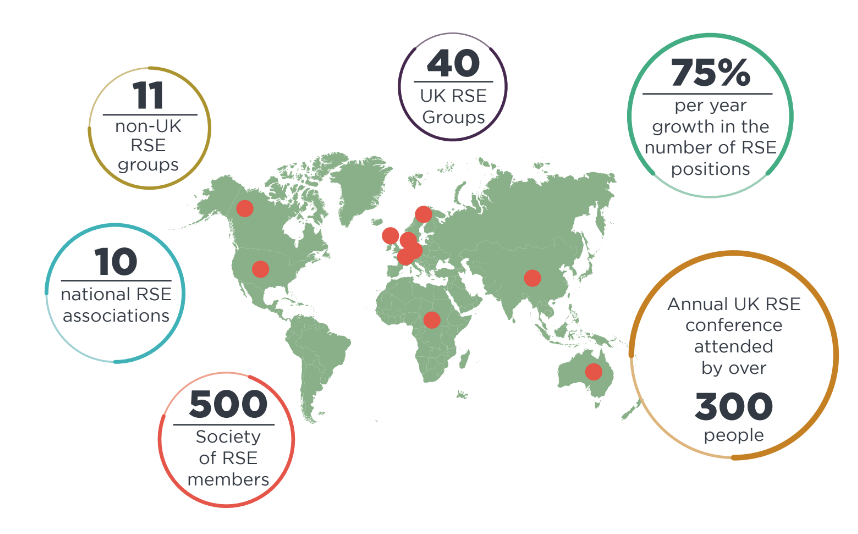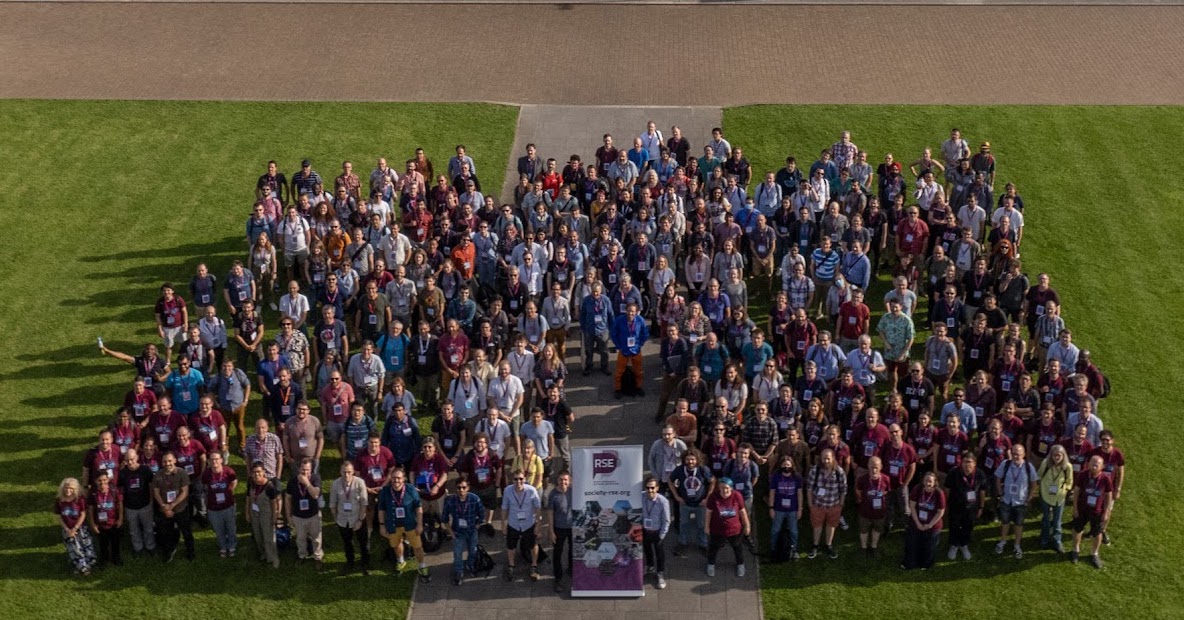Changing research culture
Research relies on software, but there has historically been no formal role for software engineers in research. It was during a discussion on this systemic shortcoming at an SSI Collaborations Workshop in 2012 that the term ‘Research Software Engineer’ was coined.
Over the past ten years, the SSI has campaigned to grow the RSE concept into a large international community. In 2013 the SSI held the first workshop for RSEs, attended by 56 self-described Research Software Engineers. This new community voted unanimously to found an organisation called the UK Research Software Engineers Association (UKRSE), chaired by SSI Deputy Director Simon Hettrick.
In 2015, the SSI founded the RSE Leaders Network to support the creation of new RSE groups, which have increased in number from a single group at UCL to around 40 groups across the UK. The first RSE conference, funded through a bid won by the SSI, not only spawned a successful conference series that runs to this day but also led to the development of nine distinct international RSE associations.
In 2019, the UK RSE Association transformed into the Society of Research Software Engineering. This move enables the Society to hold funds, employ staff, and operate as an independent organisation to represent the interests of the RSE community.
Nurturing the community
Thanks in significant part to the work of the SSI, there is now a great deal of competition among institutions to recruit RSEs, and RSE leaders in particular.
The UK-based RSE movement has attracted interest from all over the world, and the SSI is increasingly helping international partners to emulate its success abroad. There are now nine national RSE associations including in the UK, Africa, Asia, Australia/New Zealand, Belgium, Germany, Netherlands, Nordic countries, and the USA.
If you are interested in how RSE Groups have been successful in the UK, then you can read about the experiences of RSE group leaders in "The secret behind the growth of RSE Groups in the UK”.

Building an international RSE community
The UK-based RSE movement has attracted interest from all over the world, and the SSI is increasingly helping international partners to emulate its success abroad. There are now nine national RSE associations including the UK, Africa, Asia, Australia/New Zealand, Belgium, Germany, Netherlands, Nordic countries, and the USA. The SSI has supported the growth of many of them. In 2017, the International Council of RSE Associations was set up to ensure cohesion and to encourage discussion around international issues.
By facilitating collaboration between these international groups, the SSI has ensured that decisions are taken collectively and without unnecessary duplication of time, effort, and resources. Thanks to the efforts of the SSI and other bodies, there are now around 10,000 RSEs worldwide.

“I absolutely love the Society of Research Software Engineers, we need the rest of the world (and funders) to catch up. Data analysis is done by writing code. Efficient, creative, performant data tools are built by writing code. You need people who professionally write code.”Professor Ben Goldacre
RSE activities and reports
From running international RSE surveys to organising and supporting the renowned annual RSE Conference, the SSI has orchestrated a campaign to grow the RSE concept into a large international community.
In 2016 we began surveying hundreds of RSEs in the UK and Canada to learn more about their demographics, impact and careers. In 2017 and 2018, we also conducted surveys in Australia, Germany, the Netherlands, New Zealand, South Africa and the USA. The latest survey was conducted in 2022 and comprised eight countries, covering all aspects of the practice of research software engineering. A summary of all surveys can be found here.
Access the latest surveyThe first RSE conference took place in 2016. It exceeded expectations – the conference attracted 202 people from 14 different countries. RSECon (the Society of Research Software Engineering’s annual
conference) now attracts over 400 attendees. The event is entirely funded by corporate sponsorship, which provides sufficient surplus to fund the work of the Society. In 2020, when physical gatherings became impossible due to the pandemic, the SSI worked with the Society to swiftly improvise a virtual alternative called SORSE (a Series of Online Research Software Events), consisting of one event every month over a six-month period. The conference has continued to flourish thanks to this determined and enterprising spirit.
The RSE Network published a State of the Nation (10.5281/zenodo.495360) report in 2017, describing the growth of the RSE community.
Access the reportUNIVERSE-HPC
The worldwide community now has approximately 10,000 Research Software Engineers (RSEs) thanks to the efforts of the SSI and other organizations. However, there is still a scarcity of RSEs, partly due to the absence of a well-defined training path.
To improve this, the SSI is collaborating with the RSE community to create a repository of open-source training materials at the master level called UNIVERSE-HPC. This initiative will enable candidates from diverse backgrounds to pursue fulfilling and valuable careers as RSEs.

Further reading
Below is a selection of articles that provide further context on the RSE movement in the UK and internationally.
- The Society of Research Software Engineering
- A not-so-brief history of RSEs
- Ten reasons to be a Research Software Engineer
- Why Science Needs More Research Software Engineers
- Life as an RSE: a terrible career choice?
- Scientific coding and software engineering: What's the difference?
- The Craftsperson and the Scholar
- RSE conferences

